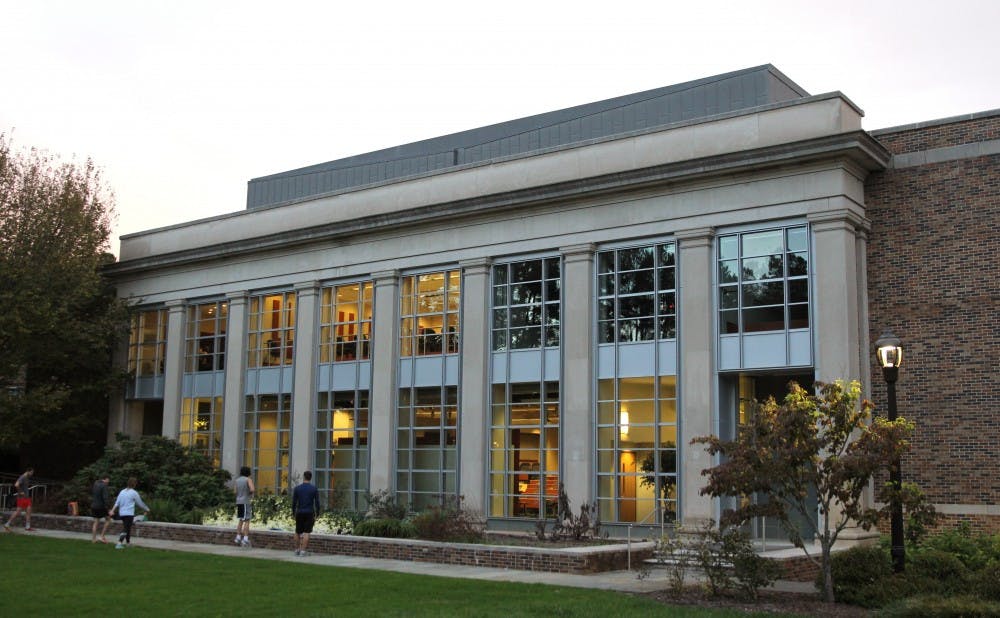Since August, thousands of Afghan refugees have arrived in the United States. Besides grappling with the anguish of leaving home and the difficulties of building new lives in a foreign country, these refugees have also had to navigate the country’s complex and often bewildering legal system.
The Duke School of Law’s Immigrant Rights Clinic has been providing legal aid and resources for the refugees, helping them escape legal limbo.
On Sept. 13, third-year law student Andrea Guzman, second-year law student Kate Weaver and Shane Ellison, a lecturing fellow in the Law School and supervising attorney for the clinic, travelled to Fort Pickett, Va. There, thousands of Afghan refugees sleep on barrock cots or in trailers in a makeshift village. Guzman, Weaver and Ellison visited to present legal aid and counseling to the refugees.
In the coming months, North Carolina will resettle more than a thousand Afghan refugees in six cities, including Charlotte, Raleigh and Durham. Many came with only as much as they could carry in the chaotic evacuation earlier this year, and some lost their personal items at airports along the way, including passports, identification and official documents. Most have a legal status called humanitarian parole, a temporary measure to allow people who would otherwise be inadmissible into the U.S.
Student attorneys involved in the clinic, such as third-year law student Sofi Kim, have been helping refugees navigate the process of filing immigration applications. For a state that currently ranks last in the country for likelihood of legal representation in immigration cases, this pro bono work provided by the clinic is essential.
“As this crisis began to unfold, and as the legal needs of the new evacuees became apparent, we decided that we wanted to be involved in responding to the crisis and providing legal assistance,” Ellison said.
Since 2019, the clinic has advocated for the rights of non-citizens, defending individuals against deportation and partnering with outside organizations to support these individuals and to educate them about their rights.
Student attorneys work under the supervision of practicing attorneys, learning skills such as oral and written advocacy and evidence gathering that are carried into future practices. Led by Ellison and Kate Evans, the clinic’s director and clinical professor of law, student attorneys have presented asylum claims in federal courts, filed amicus briefs and prepared detainees for credible fear interviews.
The clinic helps refugees navigate the complex process of receiving legal designations as well as assisting them with paperwork.
Immigration law is a constantly evolving field, and legal definitions are not always clear given the different circumstances of refugees. Refugees face difficulties finding files that give them the best chance of finding a permanent status in the U.S., and even those in the clinic have had trouble analyzing documents that are often nearly 80 pages long.
“We were trying to figure out, ‘What does that mean?’ What are they looking for here?” Weaver said.
The hurried evacuation of Afghan refugees meant that there was little time to plan for legal designation once entering the U.S. While the word “refugee” is well-understood in colloquial terms, to become legally designated as a refugee is an arduous process.
“Evacuees are not necessarily refugees. ‘Refugees’ is a legal determination. It's based on whether or not you're at risk of persecution in your home country on account of special grounds recognized by statute,” Evans said.
She said that while many of the people who fled Afghanistan meet that definition, they haven’t gone through the process to demonstrate that they do.
For many of the refugees, the immigration process was delayed until they could find proper documents for legal verification. Navigating the immigration process is extremely difficult without verification, and Ellison found that some refugees had their bags with identity documents processed for weeks at different airports while they were living on base.
Many refugees are also concerned about bringing their family members still in Afghanistan to the U.S. The attorneys have trouble meeting immigration requirements for refugees’ families, Kim said, since the family members are often in hiding and cannot send passport-style photos or evidence related to employment due to fear of being put in danger.
“A lot of times, their evidence isn't available because they didn't have everything on hand at that moment because the situation was so quickly evolving,” Kim said.
Working directly with refugees has revealed the intricacy of the U.S. immigration process and the necessity of legal assistance for refugees, Weaver said.
“That was meaningful and insightful as to how complicated immigration laws are for people navigating that system,” Weaver said. “They may or may not have an attorney and have to figure all this out on their own, and it's really difficult.”
Kim reflected on her experiences with one of the clinic’s clients who fled Afghanistan because of the danger he and his family faced with the Taliban takeover. She, along with others in the clinic, assisted him in filing applications for his relatives.
“When you're just in doctrinal classes, you're sort of removed from the reality and the actual people that are impacted by the law and these cases,” Kim said. “But because you get to work directly with clients and oftentimes meet them in person, that definitely adds a human aspect to the work that we're doing.”
Get The Chronicle straight to your inbox
Signup for our weekly newsletter. Cancel at any time.

Audrey Wang is a Trinity junior and editor-in-chief of The Chronicle's 119th volume.

